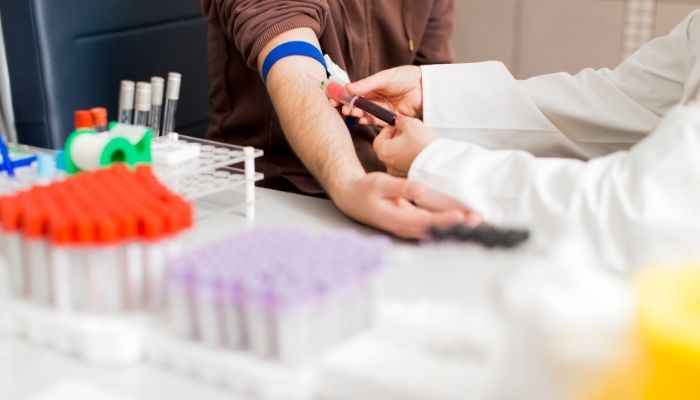A CO2 blood test evaluates the amount of carbon dioxide in your bloodstream. If you have inadequate or too much carbon dioxide levels in blood, then you may have various health problems. Your doctor may recommend this CO2 test as a part of a metabolic panel. A metabolic panel comprises a group of tests that checks electrolytes and blood gases. Your doctor may refer to this test to check whether there is an imbalance between the oxygen and carbon dioxide in your blood. These imbalances indicate that you may have diseases like a kidney, respiratory, or metabolic disorder.

The cost of the carbon dioxide blood test is Rs.500 to Rs.1000, depending on your location and place. Please check the price of the carbon dioxide test in Delhi/NCR, your nearby centers and other details.
Summary of CO2 Blood Test
| Also known as | CO2 content, carbon dioxide blood test, bicarbonate blood test, bicarbonate test, total CO2; TCO2; carbon dioxide content; CO2 content; bicarb; HCO3 |
| Test Type | Blood |
| Carbon dioxide test includes | To check the levels of carbon dioxide in your blood |
| Preparation | You may need to do fasting for 8-12 hours before the test. Also, inform your doctor whether you are taking medications like corticosteroids or antacids |
| Reporting | Within 24 hrs |
| Test price | The cost of the carbon dioxide blood test is Rs.500 to Rs.1000, depending on your location and place. |
| Also included in | Health Insurance Plans |
| Related tests | Bicarbonate test, HCO3 test, CO2 test serum |
Your body has two major forms of CO2
- HCO3 (bicarbonate, the main form of CO2 in the body)
- PCO2 (carbon dioxide)
Prime Purpose of CO2 Blood Test
Based on your symptoms, your doctor may refer to this test. Some popular signs of an imbalance of oxygen and carbon dioxide or a pH imbalance are:- Shortness of breath
- Breathing difficulties
- Nausea
- Vomiting
Do You Need Any Special Preparation for This CO2 Test?
You may need to do fasting for this test. Inform your doctor if you are taking medications like antacids or corticosteroids.Blood Sample Collection for CO2 Test
For this test, your blood sample could be collected either from a vein or from an artery.Venipuncture Blood Sample
In this type, your blood sample is taken from a vein. Your doctor will suggest a venipuncture blood test if he only wants to check HCO3.For this test,
- A healthcare provider cleans the site preferably the upper side of your arm with an antiseptic
- Then, he may tie up an elastic band around your upper arm to identify the vein
- He will insert the needle into the vein and collect your blood sample in a tube
- Finally, he will remove the elastic band and the needle
- A bandage or gauze will be placed at the puncture site
Arterial Blood Sample
Blood gas analysis is an integral part of the CO2 test. A blood gas analysis demands arterial blood because the gases and pH levels in the arteries may vary from venous blood.Arteries transport oxygen throughout the body; on the other hand, veins carry deoxygenated blood to the lungs that are exhaled as carbon dioxide and excreted through the kidneys in the form of urine. Arterial blood collection is an intricate process and thus, this type of collection demands an experienced practitioner.
- An expert cleans the site with a germ-killing antiseptic
- He then inserts a needle into the artery and collects blood carefully
- The collected sample is deposited in a tube until it is full
- Then, he gently removes the needle
- The person then applies pressure to the puncture site for at least five minutes to ensure the bleeding stops.
- Then, he wraps the puncture site that you need to keep for at least an hour
The Interpretation of CO2 Blood Test Results
The normal range for CO2 is between 23 to 29 mEq/L (milliequivalent units per liter of blood).This blood test also evaluates the pH of blood along with CO2 levels to find out the causes of your symptoms. Blood pH is either acidic or alkaline. Alkalosis is a condition when your body fluids are too alkaline. When your blood fluids are acidic, then it is called acidosis.
A blood pH measurement that is less than 7.35 is considered acidic. But when the blood pH measurement is greater than 7.45, then it is called alkaline.
Low Bicarbonate (HCO3)
A low bicarbonate condition (pH less than 7.35) is called metabolic acidosis. Common causes are- Kidney failure
- Excessive diarrhea
- Lactic acidosis
- Seizures
- Cancer
- Lack of oxygen due to severe anemia, heart failure, or shock
- Diabetic ketoacidosis (diabetic acidosis)
- Hyperventilation
- Fever
- Pain
- Anxiety
High bicarbonate (HCO3)
A test result of high bicarbonate and low pH (less than 7.35) is a condition known as respiratory acidosis. Common causes of this symptom are- Pneumonia
- Asthma
- Pulmonary fibrosis
- Too much exposure to toxic chemicals
- Tuberculosis
- Lung cancer
- Pulmonary hypertension
- Too much obesity
- Frequent vomiting
- Inadequate potassium levels
- Hypoventilation
